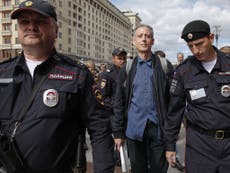Usually boycotting a world sporting event would seem extreme, but this is Putin's Russia we're talking about
The reality of Russian foreign policy is in such sharp, indeed grotesque, contrast to the civilised, cuddly image symbolised in Zabivaka, the friendly wolf adopted as the mascot of this World Cup
If nothing else, the Fifa World Cup in Russia proves conclusively that sport and politics, at least in certain hands, mix rather well.
The opening ceremony and pre-publicity for the tournament amounted to a virtual global party political broadcast for Vladimir Putin. As Boris Johnson pointed out some time ago, and wisely for a change, the celebrations in Moscow have uncomfortable echoes of the 1936 Berlin Olympics in their propaganda value. The international community should have thought again about the Russian World Cup.
Teams and fans from all over the world – including of course the UK (or, more accurately, England), have turned up for the festivities. It is true that Prince William and Theresa May won’t be there – given the Russians’ attempt on the lives of the Skripals in Salisbury that really would have been hypocritical. However, Robbie Williams sang and Harry Kane and the rest of the English footballing elite will be, and that probably matters more to the general public here and abroad.
As far as the Russians are concerned, there is not much sign of a common international front expressing its unrelenting displeasure and anger at their policies. Crown Prince Mohammed bin Salam of Saudi Arabia is a high-profile guest at the opening events, and the first game between Russian and Saudi squads. (Russia and Saudi Arabia being at the bottom both of the international leagues for human rights as well as footballing prowess.)
President Macron of France has promised to go to Russia “when” les bleus reach the semi-final stage; Chancellor Merkel may well turn up to cheer on Germany at some point. The best thing that can be found to a snub among the relevant G7 nations is the Japanese prime minister, Shinzo Abe, who has given a guarantee of his attendance should Japan find itself playing Russia in the final on 15 July.
If there was case for boycotting the World Cup, and moving it to a more suitable host nation, it was made long ago – collusion in the use of chemical weapons in Syria, the Skripals affair, the annexation of Crimea, the occupation of eastern Ukraine, multiple cyber attacks, the discovery of interference in foreign elections, attacks on other countries’ digital infrastructure…the litany of Russian provocations goes on.
Yet, despite economic sanctions and diplomatic gestures, the one move that would have seriously embarrassed the Russians – the international community turning their backs on the World Cup – was never a realistic prospect. In its own small way, it explains much of the Russians appetite for risk in international affairs – they simply keep getting away with it.
The reality of Russian foreign policy is in such sharp, indeed grotesque, contrast to the civilised, cuddly image symbolised in Zabivaka, the friendly wolf adopted as the mascot of this championship. There is no such thing, in the natural world nor in international diplomacy, as a friendly wolf. Perhaps that is Mr Putin’s idea of satire, a nice twist on the old line of “a wolf in sheep’s clothing”.
The international community has also chosen to ignore Russia’s shameful domestic record on human rights – a home loss, you might say. As the opening ceremony got under way, Amnesty International tweeted: “Human rights have taken a significant nose-dive in #Russia in recent years, making it impossible to ignore the rampant human rights violations happening in the host country of the 21st Fifa #WorldCup”.
As if to prove their point, the Russian police have already arrested human rights campaigner Peter Tatchell, on a peaceful protest. Virtually everywhere in Russia civil liberties are routinely abused: the rights to freedom of expression, association and peaceful assembly have been curtailed even further since Mr Putin’s re-election as president.
There is torture; harassment of religious minorities; violations of free trials and free speech; commonplace ill-treatment of refugees and migrants; domestic violence decriminalised and LGBT+ rights disregarded. There is also the continued brutality and subjugation of the Chechen people. The behaviour of the “ultra” Russian football hooligans confirms the streak of racism and nationalism that disfigures Russian society, and which the authorities all too happily tolerate.
The fact that some of the other competing nations – Saudi Arabia, Iran, Egypt, for example – are also serial abusers of human rights merely adds to the ugly reality of this contest.
It is true that there are few sporting events where politics can be safely ignored, which is to say they can be engaged in with an entirely clear conscience. As with international trade or cultural jamborees, they involve countries with governments that fail to meet even minimal standards of humanity and decency. Yet there is something especially objectionable about this World Cup tournament because there is something especially objectionable about Russia – its sheer power and the scale of its activities, stretching to the actual use of weapons of mass destruction.
Many will forget about the truth about Russian life and aggression abroad as they enjoy the hospitality and the no doubt spectacular displays of skill we are about to witness on TV. That, though, is merely the paradox of the friendly wolf.



Join our commenting forum
Join thought-provoking conversations, follow other Independent readers and see their replies